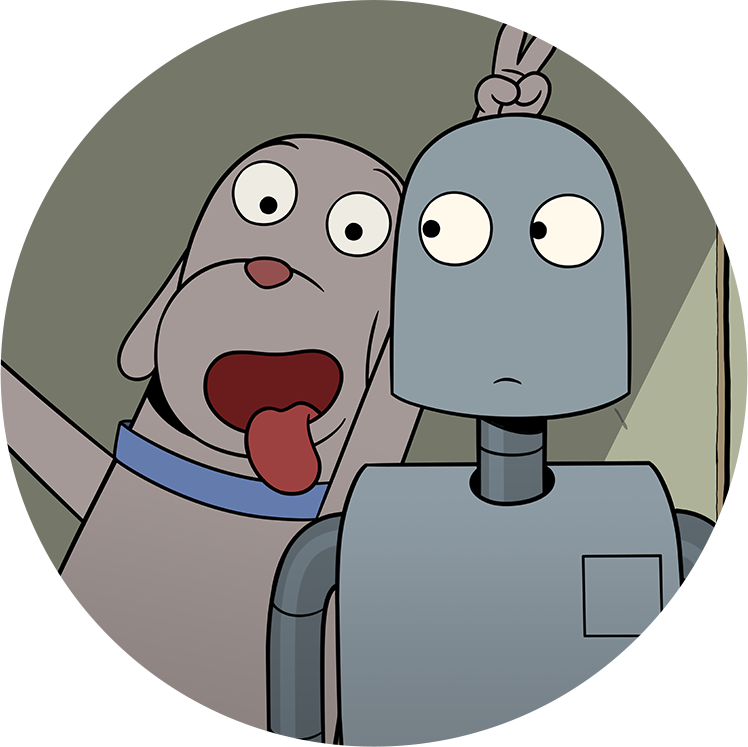
Spain’s animation and VFX industry is currently the audiovisual sector with the biggest growth opportunities in the country, as new companies focus on original IP and strike key international partnerships.
Solid reasons for optimism
The remarkable journey of Robot Dreams debuting at Cannes Premières and culminating in its nomination to the 2024 Academy Awards for Best Animated Feature is the perfect example of how buoyant the Spanish animation sector has become. Indeed Robot Dreams became the fourth Spanish film to win the European Film Award for Best Animated Feature in 7 years, positioning the country as a powerhouse alongside France.
Spain animated sector is also an example of diversity: Unicorn Wars, Sultana’s Dream, They Shot the Piano Player, Mummies… amidst their profound diversity, these titles and their trajectories offer additional merits, signifying a peak moment for the industry. They demonstrate a willingness to engage diverse audience segments and showcase visible efforts towards internationalization in both production and distribution. Embedded within this endeavour for international promotion and diffusion lies the solid participation of Spanish animation in competitions worldwide.
Production numbers at its peak
Regarding production data, according to information provided by the ICAA, in 2023, 6 feature films led by national companies and 25 short films were certified, consistent with the figures from 2022 (6 and 30 respectively). Regarding TV series, we can jump on DIBOOS Whilte Paper, where we can see an steady growth in production too: from 49 seasons in 2022 to 68 in 2023, counting both TV series and webseries for video-sharing platforms. This includes recent titles such as I, Elvis Riboldi (broadcasted in more than 140 countries), Hero Dad (the first series produced using Unity as render motor), Jasmine&Jambo (two-times winner of the Best Iberoamerican Animated Series at Quirino awards 2023 and 2024) or licensing-driven titles such as Cry Babies, BFF or I Love VIP Pets, produced by Hampa Studio for the Spanish toymaker powerhouse IMC Toys.
These statistics indicate progress towards the consolidation of an industry that encompasses some 300 companies, according to ICEX figures, and boasts a significant network of training centres across the country to foster talent and ensure future growth. Most of these production companies are young firms with more flexible structures. They tend to be internationally focused, quick to adapt to new market trends and willing to share expertise and talent with each other.
Tax breaks help fuel production
While the Spanish government had to cut support to the audiovisual sector due to financial restrictions during the economic crisis, the situation changed in 2016 with new regulations and the creation of nationwide tax deductions for investment in audiovisual production, service work and technological innovation. These deductions have been recently improved, from 2020 onwards, fostering the competitiveness of the country. Animation made in Spain can benefit for a general tax credit ranging from 30% to 25%, and so can benefit international companies who subcontract animation services in the country starting at 200,000 Euro investments.
As Spain is a highly decentralized unitary state, some regional governments have their own tax resources and so can decide on the level of tax incentives they choose to offer. This means some higher tax rebates, such as the 50-45% rebate for national and international animation productions offered in the Canary Islands, 40% rebate in Navarre, or 60% rebate for national animation titles in Basque Country (if the expenditure in the region exceeds 50% of the production cost). And if the audiovisual production is in the Basque language, the tax break increases to 70%. These deduction percentages are the highest in Europe, and the impact of these measures is expected to be felt soon.
Thus, Spain has been able to attract both local and international companies to set up animation studios in destinations where the tax incentives are on offer. However, most Spanish companies remain headquartered in either Madrid or Barcelona, which keep being the major industrial poles, closely followed by Canary Islands.
One key issue is that there are currently no dedicated funds for animation in Spain nationwide, although animated feature films can apply for generic cinema funds (not series). Local producers are talking to the Spanish Centre for Cinema and Audiovisual (ICAA) to explore the possibility of introducing a new fund specifically for the production of animated feature films and animated TV series, expected to happen in recent future. Some regional film institutes cover this gap to finance animation titles through dedicated funding schemes, such as ICEC in Catalonia (the region supporting the more audiovisual sector in Spain) or IVAC in Valencia. There is also a new grant program, Ibermedia Next, launched in 2023 by Ibermedia; this program grants an amount of 150,000 Euro for digital animation or live-action shows with a significant percentage of VFX/Animation in it.
There is always more ground to cover, and one of the ongoing demands of the industry remains the increase in support for development. Until now, this support has been on par with live-action productions, despite animation processes being considerably longer and more costly. The contribution from Ibermedia Next or some specific regional funds (such as ICEC in Catalonia) is a step in the right direction.
Dedicated coproducers
Broadcasters remain the main source of financing for animation companies in Spain, with Spanish broadcaster RTVE’s children’s channel Clan being the main investor in animation series and films, although the total allocation per year is far from those in other Western European countries (compared to RAI, ZDF or FranceTV). Catalan public broadcaster 3CAT is also actively coproducing animation projects (both series and films), followed by À Punt in Valencia and, in a lower extent, ETB in Basque Country or TVG in Galicia. On the contrary, the country’s private channels focus on acquiring finished content with the occasional pre-buy of animated films, but hardly ever TV series. There are always exceptions, however, such as Pobre Diablo, a production from Buendía Estudios and Rokyn Animation (released in HBO in early 2023). This title marked some milestones, such as the first adult animation series being a platform original in Spain and also being in the top-5 most watched series in HBO at its worldwide release.
Nevertheless, funding from local broadcasters is never enough to fully finance productions. Many Spanish companies are therefore well versed in striking coproduction partnerships in Europe and territories as far afield as Asia or Latin America in order to complete financing jigsaws. The Spanish animation sector looks set to continue to go from strength to strength. However, much depends on improved government support, studios’ capacity to retain talented technicians and artists, alongside producer’s ability to retain rights to and profit from the original IP they create.

Spain’s animation and VFX industry is currently the audiovisual sector with the biggest growth opportunities in the country, as new companies focus on original IP and strike key international partnerships.
Solid reasons for optimism
The remarkable journey of Robot Dreams debuting at Cannes Premières and culminating in its nomination to the 2024 Academy Awards for Best Animated Feature is the perfect example of how buoyant the Spanish animation sector has become. Indeed Robot Dreams became the fourth Spanish film to win the European Film Award for Best Animated Feature in 7 years, positioning the country as a powerhouse alongside France.
Spain animated sector is also an example of diversity: Unicorn Wars, Sultana’s Dream, They Shot the Piano Player, Mummies… amidst their profound diversity, these titles and their trajectories offer additional merits, signifying a peak moment for the industry.
They demonstrate a willingness to engage diverse audience segments and showcase visible efforts towards internationalization in both production and distribution.
Embedded within this endeavour for international promotion and diffusion lies the solid participation of Spanish animation in competitions worldwide.
Production numbers at its peak
Regarding production data, according to information provided by the ICAA, in 2023, 6 feature films led by national companies and 25 short films were certified, consistent with the figures from 2022 (6 and 30 respectively). Regarding TV series, we can jump on DIBOOS Whilte Paper, where we can see an steady growth in production too: from 49 seasons in 2022 to 68 in 2023, counting both TV series and webseries for video-sharing platforms. This includes recent titles such as I, Elvis Riboldi (broadcasted in more than 140 countries), Hero Dad (the first series produced using Unity as render motor), Jasmine&Jambo (two-times winner of the Best Iberoamerican Animated Series at Quirino awards 2023 and 2024) or licensing-driven titles such as Cry Babies, BFF or I Love VIP Pets, produced by Hampa Studio for the Spanish toymaker powerhouse IMC Toys.
These statistics indicate progress towards the consolidation of an industry that encompasses some 300 companies, according to ICEX figures, and boasts a significant network of training centres across the country to foster talent and ensure future growth. Most of these production companies are young firms with more flexible structures. They tend to be internationally focused, quick to adapt to new market trends and willing to share expertise and talent with each other.
Tax breaks help fuel production
While the Spanish government had to cut support to the audiovisual sector due to financial restrictions during the economic crisis, the situation changed in 2016 with new regulations and the creation of nationwide tax deductions for investment in audiovisual production, service work and technological innovation. These deductions have been recently improved, from 2020 onwards, fostering the competitiveness of the country. Animation made in Spain can benefit for a general tax credit ranging from 30% to 25%, and so can benefit international companies who subcontract animation services in the country starting at 200,000 Euro investments.
As Spain is a highly decentralized unitary state, some regional governments have their own tax resources and so can decide on the level of tax incentives they choose to offer. This means some higher tax rebates, such as the 50-45% rebate for national and international animation productions offered in the Canary Islands, 40% rebate in Navarre, or 60% rebate for national animation titles in Basque Country (if the expenditure in the region exceeds 50% of the production cost). And if the audiovisual production is in the Basque language, the tax break increases to 70%. These deduction percentages are the highest in Europe, and the impact of these measures is expected to be felt soon.
Thus, Spain has been able to attract both local and international companies to set up animation studios in destinations where the tax incentives are on offer. However, most Spanish companies remain headquartered in either Madrid or Barcelona, which keep being the major industrial poles, closely followed by Canary Islands.
One key issue is that there are currently no dedicated funds for animation in Spain nationwide, although animated feature films can apply for generic cinema funds (not series). Local producers are talking to the Spanish Centre for Cinema and Audiovisual (ICAA) to explore the possibility of introducing a new fund specifically for the production of animated feature films and animated TV series, expected to happen in recent future. Some regional film institutes cover this gap to finance animation titles through dedicated funding schemes, such as ICEC in Catalonia (the region supporting the more audiovisual sector in Spain) or IVAC in Valencia.
There is also a new grant program, Ibermedia Next, launched in 2023 by Ibermedia; this program grants an amount of 150,000 Euro for digital animation or live-action shows with a significant percentage of VFX/Animation in it.
There is always more ground to cover, and one of the ongoing demands of the industry remains the increase in support for development. Until now, this support has been on par with live-action productions, despite animation processes being considerably longer and more costly. The contribution from Ibermedia Next or some specific regional funds (such as ICEC in Catalonia) is a step in the right direction.
Dedicated coproducers
Broadcasters remain the main source of financing for animation companies in Spain, with Spanish broadcaster RTVE’s children’s channel Clan being the main investor in animation series and films, although the total allocation per year is far from those in other Western European countries (compared to RAI, ZDF or FranceTV). Catalan public broadcaster 3CAT is also actively coproducing animation projects (both series and films), followed by À Punt in Valencia and, in a lower extent, ETB in Basque Country or TVG in Galicia. On the contrary, the country’s private channels focus on acquiring finished content with the occasional pre-buy of animated films, but hardly ever TV series. There are always exceptions, however, such as Pobre Diablo, a production from Buendía Estudios and Rokyn Animation (released in HBO in early 2023). This title marked some milestones, such as the first adult animation series being a platform original in Spain and also being in the top-5 most watched series in HBO at its worldwide release.
Nevertheless, funding from local broadcasters is never enough to fully finance productions. Many Spanish companies are therefore well versed in striking coproduction partnerships in Europe and territories as far afield as Asia or Latin America in order to complete financing jigsaws. The Spanish animation sector looks set to continue to go from strength to strength. However, much depends on improved government support, studios’ capacity to retain talented technicians and artists, alongside producer’s ability to retain rights to and profit from the original IP they create.

DIBOOS
The Spanish Federation of Animation and VFX Producers’ Association is the umbrella body of the sector’s main associations, integrating AEPA (Spanish Association of Animation Producers) and PROAnimats (Association of Animation Producers), representing a high percentage of the production of Spanish animation.
DIBOOS is devoted to promoting the Spanish animation and visual effects sector in two different arenas: as a pole of cultural creation and as an industry. Regarding the first one, animation generates a common imaginary that must be preserved; as for the second one, the sector claims its important role as generator of stable employment and exports (more than 70% of firms’ turnover comes from abroad), as well as a growing investment in R&D.
PROAnimats
PROAnimats is the Barcelona-based professional association of animation producers. Created in 2007, it is federated to PROA (Nationwide Federation of the Audiovisual Producers made up of seven associations, PROA currently includes over 200 production companies and is still expanding and growing) and to DIBOOS.
Providing advising and promoting dialogue and cohesion among its partners, ProAnimats has achieved a relevant and valued position among the different agents in the field and has a long track record regarding European collaboration. PROAnimats was one of the members of ALICE (the Animation League for Increasing Cooperation in Europe), an Interreg-financed program specifically designed to foster coproduction between regions in Europe, and hosts the annual think tank ANIMAR in Barcelona together to its mother umbrella PROA.
DIBOOS
The Spanish Federation of Animation and VFX Producers’ Association is the umbrella body of the sector’s main associations, integrating AEPA (Spanish Association of Animation Producers) and PROAnimats (Association of Animation Producers), representing a high percentage of the production of Spanish animation.
DIBOOS is devoted to promoting the Spanish animation and visual effects sector in two different arenas: as a pole of cultural creation and as an industry. Regarding the first one, animation generates a common imaginary that must be preserved; as for the second one, the sector claims its important role as generator of stable employment and exports (more than 70% of firms’ turnover comes from abroad), as well as a growing investment in R&D.
PROAnimats
PROAnimats is the Barcelona-based professional association of animation producers. Created in 2007, it is federated to PROA (Nationwide Federation of the Audiovisual Producers made up of seven associations, PROA currently includes over 200 production companies and is still expanding and growing) and to DIBOOS.
Providing advising and promoting dialogue and cohesion among its partners, ProAnimats has achieved a relevant and valued position among the different agents in the field and has a long track record regarding European collaboration. PROAnimats was one of the members of ALICE (the Animation League for Increasing Cooperation in Europe), an Interreg-financed program specifically designed to foster coproduction between regions in Europe, and hosts the annual think tank ANIMAR in Barcelona together to its mother umbrella PROA.


 Animation in Spain
Animation in Spain